小升初英语介词
小升初英语考点介词
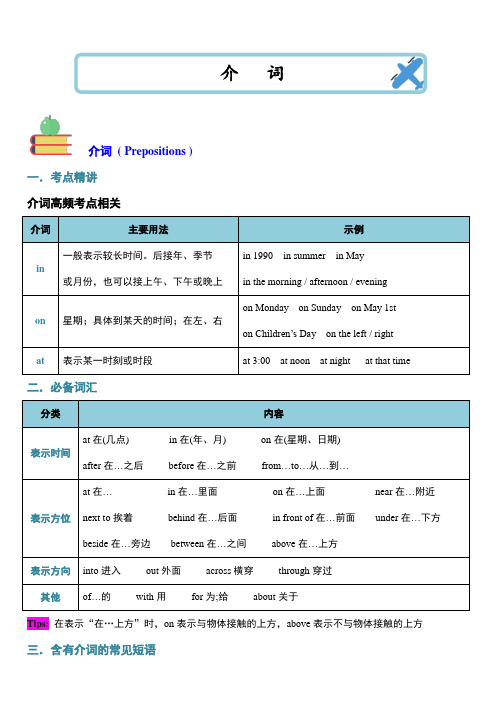
介词介词( Prepositions )一.考点精讲介词高频考点相关介词主要用法示例in一般表示较长时间。
后接年、季节或月份,也可以接上午、下午或晚上in 1990 in summer in Mayin the morning / afternoon / eveningon 星期;具体到某天的时间;在左、右on Monday on Sunday on May 1ston Children’s Day on the left / rightat 表示某一时刻或时段at 3:00 at noon at night at that time 二.必备词汇分类内容表示时间at在(几点) in在(年、月) on在(星期、日期)after在…之后before在…之前from…to…从…到…表示方位at在…in在…里面on在…上面near在…附近next to挨着behind在…后面in front of在…前面under在…下方beside在…旁边between在…之间above在…上方表示方向into进入out外面across横穿through穿过其他of…的with用for为;给about关于Tips: 在表示“在…上方”时,on表示与物体接触的上方,above表示不与物体接触的上方三.含有介词的常见短语at home在家at first首先at once立刻be afraid of害怕be angry with生气ask for要求be good for对…有益agree with同意be good at擅长get on上车by the way顺便说一下be different from与…不同be famous for因…而出名get off下车come from来自listen to听laugh at嘲笑get to到达look at看look after照顾look like看起来像look for寻找play with玩…put on穿上in English用英语on holiday度假in front of…在…前speak to和…讲话take off脱下talk about谈论try on试穿turn on打开write to给…写信四.真题速递1. We usually stay _______ home _______ Saturday afternoon (单项选择)A. at ; inB. at ; onC. in ; atD. on ; on2. Help me _______ my English, please. I don’t it’s good _______ me. (单项选择)A. with ; forB. on ; toC. on ; forD. with ; at3. My father’s birthday is _______ August 26th. (填写恰当的介词)【参考答案】1. B 2. D 3. on。
小升初英语复习语法篇之介词

---------------------------------------------------------------最新资料推荐------------------------------------------------------小升初英语复习语法篇之介词小升初英语复习语法篇之介词一、定义介词 preposition 缩写 prep.,又叫前置词,表示其后的名词或代词(或是相当于名词的其他短语或从句)与其他句子成分的关系。
介词是一种虚词,不能单独在句中作成分。
二、介词的用法 1、表示时间的(at 、 on、 in、 at、before,after、 by、 until、 through、 from、 since、 within)(1)at:用于表示时刻,时间的某一点。
atnoon 在午时atnight 在夜间atpresent 目前(2)on:用于星期,某天,某一天的上午、下午、晚上(指具体的某一天时,一律用) onsunday 在星期天onsundaymorning 在星期天的上午onmarch8 在 3 月8 日(3)in:用于表示周、月、季节、年、泛指上午、下午、晚上。
in1999 在 1999 年 innovember 在 11 月份 insummer 在夏季intheafternoon 在下午过后(未来时间) ithinkhewillbebackinanhour.我想他一小时后就会回来。
iheardthatshewouldbebackinamonth.我听说她一个月后回来的。
(4)before:在之前weihuagotupbefore7o’clockthismorning.今天早晨,魏华在 7 点之前起床了。
1 / 12(5)after:在之后afterthat,nonoeshouldeverkillaseagull. 从那时起,任何人不得捕杀海鸥。
(6)by:在前(时间),截止(到) bythetimeiarrived,shehadalreadygone. 在我到达之前,她已经走了。
小升初介词知识点总结

小升初介词知识点总结1. in, on, at的用法in, on, at是英语中最常见的三个介词,它们在句子中起着重要的作用。
它们的用法如下:- in:in表示在某个范围内或在某个地点内。
例如:in the classroom(在教室里)、in China(在中国)。
- on:on表示在某个平面或表面上。
例如:on the table(在桌子上)、on the wall(在墙上)。
- at:at表示在某个具体的时间或地点。
例如:at 3 o'clock(在三点钟)、at the bus stop (在公交车站)。
2. with, without的用法with和without是表示具有或缺少某种特征的介词,它们的用法如下:- with:with表示带有某种特征或附带某种条件。
例如:with a book(带着一本书)、with my friends(和我的朋友们一起)。
- without:without表示不带有某种特征或不具备某种条件。
例如:without any help(没有任何帮助)、without permission(未经允许)。
3. behind, in front of的用法behind和in front of是表示位置关系的介词,它们的用法如下:- behind:behind表示在某个物体的后面。
例如:behind the door(在门后面)、behind the tree(在树后面)。
- in front of:in front of表示在某个物体的前面。
例如:in front of the school(在学校前面)、in front of the car(在车前面)。
4. between, among的区别between和among都表示在两个或多个事物之间的关系,但它们的用法有一些区别:- between:between表示在两个事物之间的关系。
例如:between the two trees(在两棵树之间)、between Monday and Friday(在星期一和星期五之间)。
(完整版)小升初英语介词专项
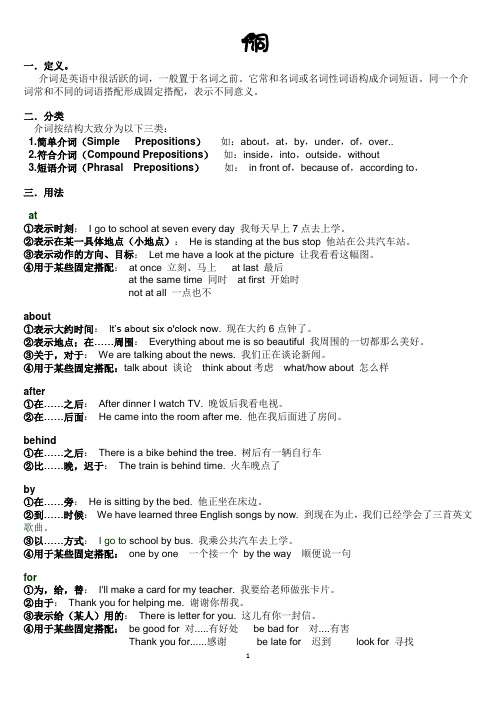
介词一.定义。
介词是英语中很活跃的词,一般置于名词之前。
它常和名词或名词性词语构成介词短语。
同一个介词常和不同的词语搭配形成固定搭配,表示不同意义。
二.分类介词按结构大致分为以下三类:1.简单介词(Simple Prepositions)如:about,at,by,under,of,over..2.符合介词(Compound Prepositions)如:inside,into,outside,without3.短语介词(Phrasal Prepositions)如:in front of,because of,according to,三.用法at①表示时刻:I go to school at seven every day 我每天早上7点去上学。
②表示在某一具体地点(小地点):He is standing at the bus stop 他站在公共汽车站。
③表示动作的方向、目标:Let me have a look at the picture 让我看看这幅图。
④用于某些固定搭配:at once 立刻、马上at last 最后at the same time 同时at first 开始时not at all 一点也不about①表示大约时间:It’s about six o'clock now. 现在大约6点钟了。
②表示地点;在……周围:Everything about me is so beautiful 我周围的一切都那么美好。
③关于,对于:We are talking about the news. 我们正在谈论新闻。
④用于某些固定搭配:talk about 谈论think about考虑what/how about 怎么样after①在……之后:After dinner I watch TV. 晚饭后我看电视。
②在……后面:He came into the room after me. 他在我后面进了房间。
小升初英语专题讲解十 介词

第十讲介词介词用来表示名词、代词之间的关系。
介词通常放在名词或代词前, 构成介词短语。
1、表示时间的介词1) at①用于时刻, 钟点前。
at noon 在中午at night 在夜晚I go to school at seven every day 我每天早上7点去上学。
②用于固定搭配。
at once 立刻、马上at the same time 同时 not at all 一点也不at noon 在中午at night 在夜晚at the age of在……岁时at the end of在……结束时at last最后at first=first of all起初, 首先2)on①用于星期前, 用于具体某一天或某一天的上午、下午、晚上前, 也可用在公共节假日前。
on Monday/Tuesday.... on a cold morning在一个寒冷的早上on Teachers’ Day on Septembe r 1st②用于某些固定搭配: on duty 值日 on time 准时3) in①用在世纪、年代、月份、四前。
in 1840 in the 21st century在21世纪in spring/summer/autumn/winter在春夏秋冬in January in the morning/afternoon/evening在早上/下午/晚上2、表示地点的介词at 表示在某一具体地点at home在家at school在学校at the bus stop在公交车站on 具体到街道on Longshou Street on the left/right 在左边/右边in 大地点in China in Beijing2.表位置的介词(1). in在……里面(2). on在……上面(3). under在……下面/正下方(4).behind在……之后There is a bike behind the tree. 树后有一辆自行车.(5).next to在……旁边, 紧挨着…(6).near在……附近My bed is near the window. 我的床在窗户旁。
(完整版)小升初英语介词分类汇总表
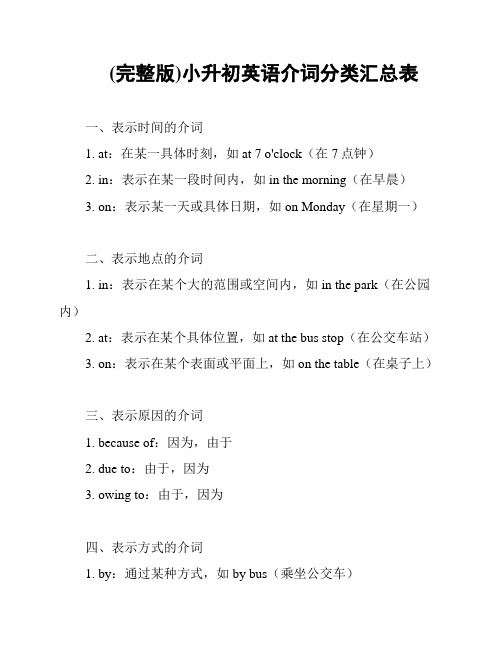
(完整版)小升初英语介词分类汇总表
一、表示时间的介词
1. at:在某一具体时刻,如at 7 o'clock(在7点钟)
2. in:表示在某一段时间内,如in the morning(在早晨)
3. on:表示某一天或具体日期,如on Monday(在星期一)
二、表示地点的介词
1. in:表示在某个大的范围或空间内,如in the park(在公园内)
2. at:表示在某个具体位置,如at the bus stop(在公交车站)
3. on:表示在某个表面或平面上,如on the table(在桌子上)
三、表示原因的介词
1. because of:因为,由于
2. due to:由于,因为
3. owing to:由于,因为
四、表示方式的介词
1. by:通过某种方式,如by bus(乘坐公交车)
2. with:用某种工具、装备或方式,如with a pen(用一支笔)
3. in:以某种状态或方式,如in a hurry(匆忙地)
五、表示目的的介词
1. for:为了,作为
2. to:朝向,向着,目的是
3. in order to:为了,以便
六、表示对比的介词
1. like:像,类似于
2. unlike:不像,不同于
3. as:像,如同
七、表示关系的介词
1. of:表示所属关系,如the book of Tom(汤姆的书)
2. to:表示联系或关系,如a friend to me(与我有关系的朋友)
3. for:表示目的或利益,如good for health(有益于健康)
以上是小升初英语介词分类汇总表的完整版,希望能对你有所
帮助。
小升初英语语法-介词
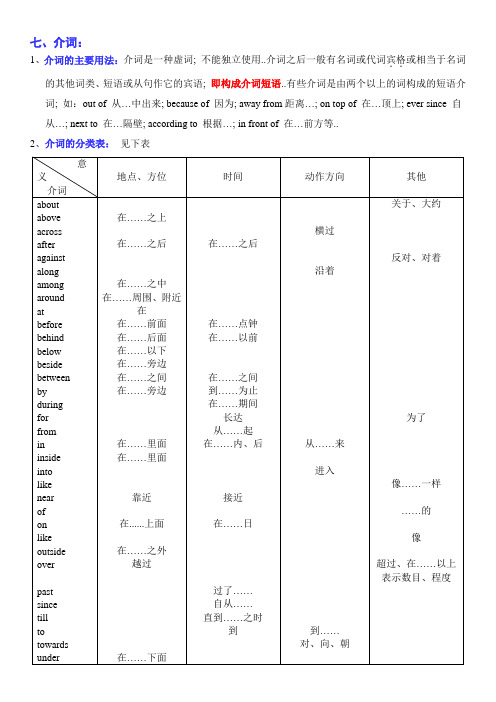
七、介词:1、介词的主要用法:介词是一种虚词; 不能独立使用..介词之后一般有名词或代词宾格..或相当于名词的其他词类、短语或从句作它的宾语; 即构成介词短语..有些介词是由两个以上的词构成的短语介词; 如:out of 从…中出来; because of 因为; away from距离…; on top of 在…顶上; ever since 自从…; next to 在…隔壁; according to 根据…; in front of 在…前方等..2、介词的分类表:见下表above 在…前; about 在…附近; across 在…对面; after 在…后面; against 倚着...;along 在…近旁; among 在…中间; around 在…周围; round 在….周围; at 在…处; before 在...前; behind 在...后; below 低于...; beside 在...旁边; between 在...之间; by 在...旁; down 在...下面; from 来自...; in 在...里面; inside 在...里面; near 靠近...; of 在...之中; on 在...上面; out of 在...之外; outside 在....外面; over 在....上方; under 在...下方; up 在...上面; on top of 在...顶部;in front of 在...前; close to 靠近...; in the middle of 在...的中间; at the end of 在...的末端;等等..across 横越...; against 对抗...; along 沿着...; around 绕着...; round 环绕...; at 朝着...;behind 向…后面; etween…and…从…到...;by 路过/通过...; down 向…下; for 向...; from 从/离...; in 进入...; into 进入...; inside 到...里面; near 接近...; off 脱离/除...; on 向...上; out of 向...外; outside 向....外; over 跨过...; past 经过/超过...; through 穿过...; to 向/朝...; towards 朝着...; on to 到...上面; onto到...上面; up 向...上; away from 远离...about 大约...; after 在…以后; at 在… 时刻; before 在…以前; by 到…为止; during 在…期间;for 有…之久; from 从…时起; in 在上/下午;在多久以后; on 在某日; past 过了…时; since 自从…至今; through 贯穿…期间; till 直到…时; until 直到…时; to 到下一时刻; ever since 从那时起至今;at the beginning of 在...开始时 ;at the end of 在...末 ; in the middle of 在...当中 ;at the time of 在...时 as 作为/当作...; by 用/由/乘坐/被...; in 用…语言; like 与…一样; on 骑车/徒步;通过收音机/电视机; over 通过收音机; through 通过...; with 用材料;用手/脚/耳/眼; without 没有…关于...; except 除了…; besides 除了…还... for 对于/就…而言; in 在…方面; of…的;有关...; on 关于/有关...; to 对…而言; towards 针对...; with 就…而言目的介词 for 为了...; from 防止…; to 为了…原因介词 for 因为...; with 由于…; because of 因为... 比较介词 as 与…一样;like 象…一样;than 比...;to 与…相比; unlike 与…不同伴随/状态介词 against 和…一起比赛;at 在上班/休息/上学/家;etc.;in 穿着…衣服/颜色;into 变成...;on在值日; with 与…一起;有/带着/长着...; without 没有/无/不与…一起3、介词短语的句法作用:介词短语相当于一个形容词或副词; 可用作状语、定语和表语..如:The man came <down the stairs>.状那个人走下楼来/The woman <with a flower on her head> is from the countryside.定头上戴花的妇女来自乡下/The teacher is now with the pupils.表老师现在和学生在一起 4、介词短语在句子中的位置:介词短语做状语时;如果表示时间/地点;可以放在句首或句尾;如果表示方向/方式/伴随/涉及/原因/目的/比较;一般放在句尾;介词短语作表语时放在连系动词之后;介词短语作定语时;只能放在被修饰的名词之后..如:He wanted to find a good job in Shanghai the next year.状语他想来年在上海找份好工作/ They searched the room for the thief.他们在房间里搜索小偷/ The letters are for you.表语信是给你的/ Have you seen a cat with a black head and four white legs 定语你看见一只黑头白腿的猫了吗5、重要注释:⑴ this / that / these / those / last / next / a / every / each等词构成的时间短语; 前面不用任何介词..如:Every year travellers from abroad come to visit Pingyao.每年都有国外的游客来游览平窑镇/ He had a bad cold that week.那个星期他患重感冒⑵for有时用来引出动词不定式的逻辑主语; 常翻译成“对于…而言”..如:It’s too hard for me tofinish the work in only one hour.让我在区区一个小时内完成这项工作太难了/ The house is bigenough for 10 men to live in.房子够大的可以容10个人住⑶of有时用来表示后面的人物正好是前面的表语的逻辑主语..如:It’s very nice/kind of you to do so.你这么做真是太好了⑷介词有时会与它的宾语分离; 而且宾语前置..①当宾语是疑问词时..Who are you talking about 你们在谈论谁②宾语在从句中当连接词时..He has a younger brother who he must take good care of.他有一个需要他照顾的小弟.. / Do you know who our teacher is talking with over there 你知道我们的老师在那边和什么人谈话吗③动词不定式作定语且该动词为不及物动词; 后面有介词..I finally found a chair to sit on.我最终找到了一张椅子坐..⑸记住一些固定词组:arrive at/in到达…; on foot步行; not…at all根本不; to the north of在…以北;in the east of在…的东部; in the night在夜间; at night在晚上; be afraid of害怕…; be full of充满/ 装满….; be filled with充满/ 装满….; be good/bad for对…有益/有害; be made of由…做成; be made from由…制造; play with玩耍……; look out of朝…外面看; at the end of在…末梢/结束时;by the end of不迟于…/到…末为止; with the help of或with one’s help在…的帮助下; look after照料…; look for寻找…; on a bike=by bike骑车; help sb. with帮某人做…; get on well with与某人相处融洽;等等..6、某些介词的用法辨析:⑴时间或地点介词in、on、at的用法区别:表示时间时; in表示在一段时间里在将来时句子中则表示在一段时间之后; on表示在具体的某一天或者某天的上下午等; at表示在某个时刻或者瞬间;表示地点时; in表示在某个范围之内; on表示在某个平面上或与一个面相接触;at则表示在某个具体的场所或地点..如:He was born on the morning of May 10th.他出生于五月十日的早晨/ I usually get up at 7:00 in the morning.我通常在早上的七点钟起床/ His glasses are right on his nose.他的眼镜就架在他的鼻子上/ He is at the cinema at the moment.此刻他正在电影院⑵ after与in表示时间的用法区别:“after+具体时刻/从句”表示“在…时刻之后”常用于一般时态;“in+一段时间”表示“在多久之后”;常用于将来时态..如:He said that he would be here after 6:00.他说他六点钟之后会来这儿/ My father is coming back from England in about a month.我父亲大约一个月以后从英国回来⑶ since与for表示时间的用法区别:“since+具体时刻/that-从句”表示“自从…起一直到现在”;“for +一段斶间”表示“总共有…之久”;都常用于完成时态;如:Uncle Li has worked in this factory since 1970.李叔叔自从1970年起就在这家工厂工作了/ Uncle Li has worked in this factory for over 30 years. 李叔叔在这家工厂已经工作了30多年⑷ by、in与with表示方式的用法区别:都可以表示“工具、手段”;但是by主要表示“乘坐”某个交通工具或“以……方式”;在被动句中可以表示动作的执行者;in表示“使用”某种语言/文字;with 表示“使用”某个具体的工具、手段..如:We see with our eyes and walk with our feet.我们用眼睛看东西;用双脚走路/ Please write that article文章in English.请你用英语写那篇文章/ Let’s go to the zoo by taxi.我们打的去动物园吧../ It was written by Lao She.那是老舍写的⑸ about与on的用法区别:都可以表示“有关…”;但是about的意义比较广;而on主要表示“有关…专题/课程”..如:Tom is going to give a talk on the history of America.汤姆要作一个美国历史的报告/ They are very excited talking about the coming field trip.他们兴致勃勃地谈论着即将来到的野外旅游⑹ through与across、over的用法区别:through指“穿过…门洞/人群/树林”;across和over可以指“跨越…街道/河流”;可互换;但是表示“翻过…”时只能用over. 如:Just then a rat 鼠ran across the road.就在那时一只老鼠跑过路面/ There is a bridge across/over the river.河上有座桥/ They climbed over the mountain and arrived there ahead of time.他们翻过大山提前到达了那里/ The visitors went through a big gate into another park.参观者们穿过一个大门来到另一个公园7as与like的区别:两个词都表示“像……”;但是as译为“作为……”;表示的是职业、职务、作用等事实; 而like译为“像……一样”;表示外表;不是事实..如:Let me speak to you as a father.我以父亲的身份和你讲话..说话者是听者的父亲/ Let me speak to you like a father.让我像一位父亲一样和你讲话说话者不是听者的父亲8at the end of、by the end of、to the end、in the end的用法区别:at the end of…既可以表示时间也可以表示地点;译为“在…末;在…尽头”;常与过去时连用;by the end of…只能表示时间;译为“在…前;到…为止”;常用于过去完成时;in the end与at last基本等义;表示“终于、最后”;通常用于过去时;to the end译为“到…的终点为止”;前面往往有表示运动或连续性的动词..如:By the end of last term we had learned 16 units of Book III.到上学期期末我们已经学习了第三册16个单元/ At the end of the road you can find a big white house with brown windows.在路的尽头你能找到一幢有棕色窗户的白房子/ They left for Beijing at the end of last week.上周末他们动身去了北京/ In the end he succeeded in the final exams.他最终在期末考试中考及格了/ We should go on with the work to the end.我们应该把工作干到底/ Follow this road to the end and you will see a postoffice.沿这条路走到底就能看见一家邮电局9for a moment、for the moment、in a moment、at the moment的区别:for a moment“一会儿、片刻”=for a while;常与持续性动词连用;for the moment“暂时、目前”;常用于现在时;in amoment“一会儿、立即、马上”=soon; in a few minutes;一般用于将来时;at the moment“此刻;眼下”=now;用于现在进行时..如:Please wait for a moment.请稍等/ Let’s leave things as they are for the moment.暂时就维持现状吧/ I’ll come back in a moment.我过会儿回来/ I am very busy at the moment.眼下我很忙10but的问题:用介词but引出另一个动词时;要注意:如果前面有do;后面就用原形动词;前面没有do时;后面的动词要加to..如:I could do nothing but wait.我什么也做不了只能等/ They had no choice选择but to fight.他们没有选择只有战斗11in front of 与in the front of:in front of“在…的前面”; 与in the front of“在…的前部”..如:A car was parking in front of the hall.大厅跟前停着一辆汽车/ In the front of the hall stood a big desk.大厅前部立着一个大讲台12except与besides的区别:except“除了”;表示排除掉某人物;即不包含;而besides“除了”则表示包含;即“不仅……又……”..如:Everyone went to the Palace Museum except Tom.除了Tom;大家都去了故宫博物院Tom没有去故宫/ Besides Chinese he also studied many other subjects.除了汉语之外;他还学其他许多功课“汉语”也是他学的功课之一例题解析:1. ---What time did you get there this morning--- _________ eight.A. InB. OnC. AtD. From2. He has got a chair to sit _______; but nobody to talk ________.A. on; toB. / ; withC. on; /D. / ; to3. Where’s Lily We are all here ________ her.A. besideB. aboutC. exceptD. with4. Shanghai lies ________ the east of China.A. toB. inC. onD. at精析: 1. 答案:C.此题考查学生是否掌握了at\in \on 表示时间的用法..表示几点用at.2. 答案: A.此题考查位置介词on 和词组talk to .3. 答案:C. 此题考查四个介词的意思..能根据上、下文正确使用..4. 答案:B. 此题考查学生是否掌握了表达位置的用法..在表达东、西、南、北的方位时..在范围之内用in ; 在范围之外用to;相邻用on..练习与巩固:用适当的介词填空:st Saturday I was busy ______ my homework .2.My teacher was very angry ______ me because I was late ______ school again.3.Kathy prefers a hula hoop ______ a book.4.I will invite some friends ______ my eighteenth birthday party.5.How long has he worked ______ an inventor.6.My uncle arrived ______ the airport ______ the morning of May 3.7.I will always help my friends when they are ______ trouble.8.There is nothing ______ air ______ space.9.I won’t be back ______ June.10.______ the age ______ twenty; he had written two books.11.Mary fell ______ her bike and hurt her right leg.12.He has been away ______ China ______ three years ago.13.When I was ______ school; I was ______ the school football team.14.I think he will be ______ two o’clock.15.The teacher was given some flowers ______ his students.16.Look; the birds are singing ______ the tree.17.He left the classroom ______ all the windows open.18.My sister is ill today. She doesn’t feel ______ eating anything.19.It’s too dangerous. You must keep the children away ______ the fire.20.My parents arrived ______ a cold night.21.You should apologize ______ her ______ stepping on her foot.22.The students are sitting ______ the table; reading the newspaper.23.The city is famous ______ its football; and people there are very proud ______ their city football team.24.We are doing be tter ______ English ______ our teacher’s help.25.Don’t worry ______ me. Everything is going well ______ me.26.He was late ______ school today; and she came late ______ school; too.27.------ Do you know what happened ______ Peter yesterday ------ He was hit ______ a car.28.I like clothes made ______ cotton.29.He will go to Hangzhou ______ his car tomorrow.30.______ my surprise; the Englishman gave up halfway ______ the end.31.I saw the great changes ______ my own eyes.32.You look tired. Instead ______ working indoors you should be out ______ a walk.33.Wushu is becoming more and more popular ______ foreigners.34.If you are able to get the tickets tomorrow; please tell me ______ phone.35.There is going to be a report ______ Chinese history ______ our school this evening.36.Before 1990 there was no airline ______ the two cities.37.She is dressed ______ a white skirt ______ red flowers.38.It’s bad ______ you to go to work ______ breakfast.39.It’s very nice ______ you to get me two tickets ______ the World Cup.40.------ Where have you been these days------ I have been to Bei Daihe ______ a friend ______ Canada.41.------ Would you like some coffee------ Yes; and please get me some milk; too. I prefer coffee ______ milk.42.------ When did Mr Smith come here------ ______ nine o’clock yester day morning.43.You must stand ______ line when you are waiting ______ a bus.44.------ Jack; will you be home ______ time to see the children before they go to bed------ No problem.45.China lies ______ the east of Asia and ______ the North of Australia.46. I f you can’t pass the exam; you’ll fall ______ others.47. I have a swim every day ______ yesterday.48. We all know that the earth moves ______ the sun.49. The sunlight is coming in ______ the window.50. This room is full______students and that one is filled______ teachers.Key: 1. with 2. with; for 3. to 4. to 5. as 6. at; in 7. in; 8. but; in 9. until 10.At; of 11. off 12. from; since 13. in; on/in 14. in 15. by 16. in 17. with 18. like 19. from20. on 21. to; for 22. at 23. for; of 24. in; with 25. about; with 26. for; to 27. to; by 28. from 29. in 30. To; in 31. with 32. of; for 33. among 34. by 35. on; in 36. between 37. in; with 38. without 39. of; for 40. with; from 41.to 42. At 43. in; for 44. in 45. in; to 46. behind 47. except 48. around 49. through 50. of; with。
小升初英语介词的用法归纳
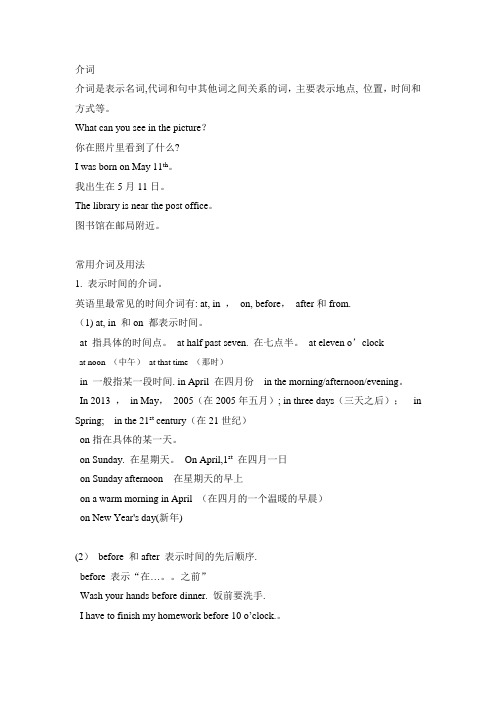
介词介词是表示名词,代词和句中其他词之间关系的词,主要表示地点, 位置,时间和方式等。
What can you see in the picture?你在照片里看到了什么?I was born on May 11th。
我出生在5月11日。
The library is near the post office。
图书馆在邮局附近。
常用介词及用法1. 表示时间的介词。
英语里最常见的时间介词有: at, in ,on, before,after和from.(1) at, in 和on 都表示时间。
at 指具体的时间点。
at half past seven. 在七点半。
at eleven o’clockat noon (中午)at that time (那时)in 一般指某一段时间. in April 在四月份in the morning/afternoon/evening。
In 2013 ,in May,2005(在2005年五月); in three days(三天之后);in Spring; in the 21st century(在21世纪)on指在具体的某一天。
on Sunday. 在星期天。
On April,1st在四月一日on Sunday afternoon 在星期天的早上on a warm morning in April (在四月的一个温暖的早晨)on New Year's day(新年)(2)before 和after 表示时间的先后顺序.before 表示“在…。
之前”Wash your hands before dinner. 饭前要洗手.I have to finish my homework before 10 o’clock.。
我不得不在十点之前做完作业。
after 表示“在….之后”,They often play football after school.他们放学后经常踢足球.My father often watches TV after dinner。
小升初英语介词
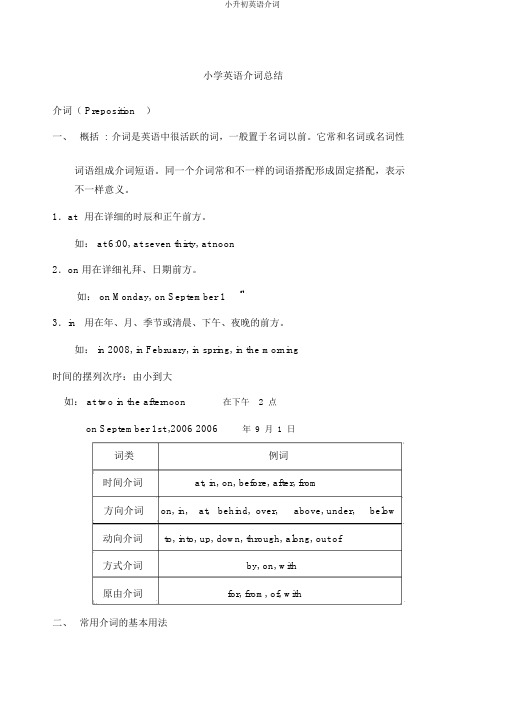
小学英语介词总结介词( Preposition)一、概括:介词是英语中很活跃的词,一般置于名词以前。
它常和名词或名词性词语组成介词短语。
同一个介词常和不一样的词语搭配形成固定搭配,表示不一样意义。
1.at用在详细的时辰和正午前方。
如: at 6:00, at seven thirty, at noon2.on 用在详细礼拜、日期前方。
如: on Monday, on September 1st3.in用在年、月、季节或清晨、下午、夜晚的前方。
如: in 2008, in February, in spring, in the morning时间的摆列次序:由小到大如: at two in the afternoon在下午2点on September 1st ,2006 2006年9月1日词类例词时间介词at, in, on, before, after, from方向介词on, in, at, behind, over, above, under, below动向介词to, into, up, down, through, along, out of方式介词by, on, with原由介词for, from, of, with二、常用介词的基本用法at①表示时间:I go to school at seven every day我每日清晨7 点去上学。
②表示在某一详细地址:He is standing at the bus stop他站在公共汽车站。
③表示动作的方向、目标:Let me have a look at the picture让我看看这幅图。
④用于某些固定搭配:at once马上、马上at last最后at the same time同时at first开始时not at all一点也不about①表示大概时间:I's about six o'clock now.此刻大概 6 点钟了。
小升初重要知识点梳理常见介词的用法与搭配
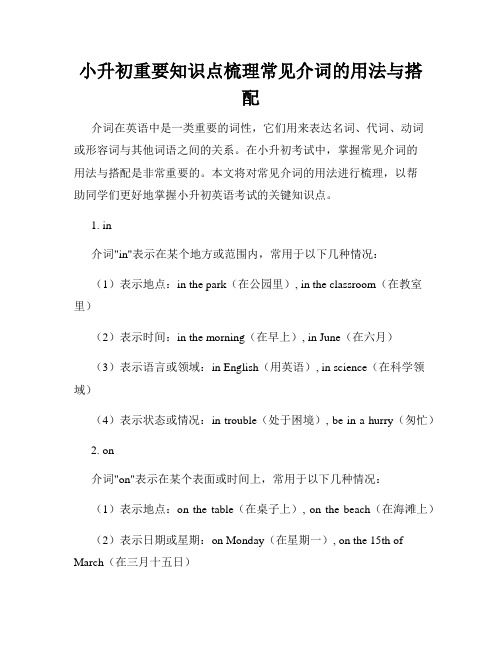
小升初重要知识点梳理常见介词的用法与搭配介词在英语中是一类重要的词性,它们用来表达名词、代词、动词或形容词与其他词语之间的关系。
在小升初考试中,掌握常见介词的用法与搭配是非常重要的。
本文将对常见介词的用法进行梳理,以帮助同学们更好地掌握小升初英语考试的关键知识点。
1. in介词"in"表示在某个地方或范围内,常用于以下几种情况:(1)表示地点:in the park(在公园里), in the classroom(在教室里)(2)表示时间:in the morning(在早上), in June(在六月)(3)表示语言或领域:in English(用英语), in science(在科学领域)(4)表示状态或情况:in trouble(处于困境), be in a hurry(匆忙)2. on介词"on"表示在某个表面或时间上,常用于以下几种情况:(1)表示地点:on the table(在桌子上), on the beach(在海滩上)(2)表示日期或星期:on Monday(在星期一), on the 15th of March(在三月十五日)(3)表示媒介或交通工具:on the radio(通过收音机), on the bus (在公交车上)3. at介词"at"表示在某个具体的地点或时间上,常用于以下几种情况:(1)表示地点:at school(在学校), at the park(在公园)(2)表示具体的时间点:at 2 o'clock(在两点钟), at Christmas (在圣诞节)(3)表示瞬间动作:laugh at(嘲笑), shout at(对...喊叫)4. by介词"by"表示通过某种方式或是靠近某人或某物,常用于以下几种情况:(1)表示方式或方法:go to school by bus(乘公交车去学校), send a message by email(通过电子邮件发送消息)(2)表示靠近:stand by the window(站在窗户边)(3)表示时间或截止日期:by next week(在下周之前), finish the project by Monday(在星期一之前完成项目)5. for介词"for"表示表示目的、理由或是接受某种东西,常用于以下几种情况:(1)表示目的或理由:study for the test(为了考试而学习), apologize for the mistake(为错误道歉)(2)表示接受:buy a gift for my mother(给我妈妈买礼物)6. with介词"with"表示伴随、具有或使用某物,常用于以下几种情况:(1)表示伴随:go to the park with my friends(和我的朋友一起去公园)(2)表示具有:a girl with blue eyes(一位拥有蓝眼睛的女孩)(3)表示使用:write with a pen(用钢笔写)7. to介词"to"表示朝向、目标或是接受,常用于以下几种情况:(1)表示朝向:go to school(去学校), run to the park(跑向公园)(2)表示目标:give the book to me(把书给我)(3)表示接受:send a letter to my friend(给我的朋友寄信)8. from介词"from"表示出发点、来源或是离开某地,常用于以下几种情况:(1)表示出发点:come from Beijing(来自北京), start from home (从家出发)(2)表示来源:receive a gift from my friend(从我的朋友那里收到礼物)(3)表示离开:run from danger(逃离危险)以上是小升初英语中常见介词的用法与搭配。
小升初英语语法知识点:介词
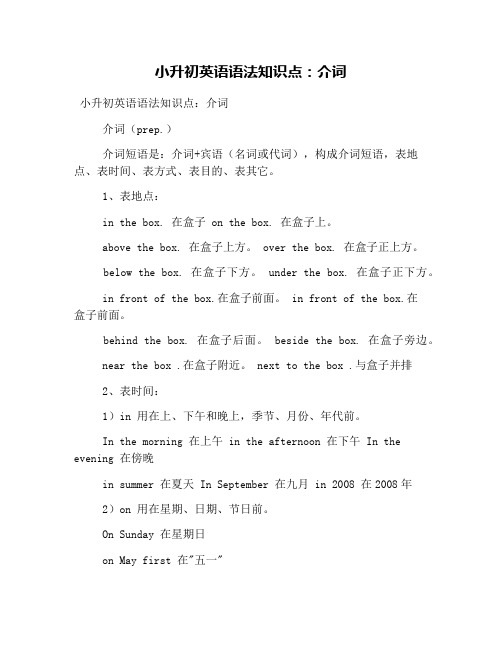
小升初英语语法知识点:介词小升初英语语法知识点:介词介词(prep.)介词短语是:介词+宾语(名词或代词),构成介词短语,表地点、表时间、表方式、表目的、表其它。
1、表地点:in the box. 在盒子 on the box. 在盒子上。
above the box. 在盒子上方。
over the box. 在盒子正上方。
below the box. 在盒子下方。
under the box. 在盒子正下方。
in front of the box.在盒子前面。
in front of the box.在盒子前面。
behind the box. 在盒子后面。
beside the box. 在盒子旁边。
near the box .在盒子附近。
next to the box .与盒子并排2、表时间:1)in 用在上、下午和晚上,季节、月份、年代前。
In the morning 在上午 in the afternoon 在下午 In the evening 在傍晚in summer 在夏天 In September 在九月 in 2008 在2008年2)on 用在星期、日期、节日前。
On Sunday 在星期日on May first 在"五一"On Children's Day 在儿童节 on Teacher's Day 在教师节 On Christmas 在圣诞节3)at 用在中午夜里几点前。
At noon 在中午 at night 在夜里 at six 在六点4)其它介词表示时间before lunch 午饭前 after lunch 午饭后 for two days 两天了in two days 两天后 from Sunday to Monday 从星期日到星期一3、表方式:by bus 乘公车 by plane 乘飞机 by bike 骑自行车 on foot 步行with me 和我一起 with a pen 用钢笔4、表目的:for supper 作为晚饭 for the people 为了人民5、表其它:like this象这样 to school 到学校 of China 关于中国except Tom 除了汤姆 without Tom没有汤姆一句话语法:早、午、晚要用in,年、月、季节、衣、冒in,将来时态in...以后,小处at大处in,At 午夜点与分,日期、星期、节日on。
小升初 介词

on 时间用法:
在星期一 on Monday 在三月二号on March 2 在星期天下午 on Sunday afternoon on 用于具体某一天及具体某一天的早、
中、晚等词的前面。
at 的用法 在6点 at 6 o’clock 在中午 at noon
at 用于时间的某点、某时刻前或短暂的
在早上
在下午
在傍晚
in the morning in the afternoon in the evening
在中午 在晚上
at noon at night
在8:00 钟 at 8:00 o’clock
表示时间的介词
in on at
in的用法
在2011年 in 2011 在冬天 in winter 在11月 in November in the morning 在早上 in the afternoon 在下午 in 用于表示年、月、季节及一般的早、
There is a duck behind the door.
What’s behind Winnie the pooh?
1
• There is a piglet(小猪) behind Winnie the pooh.
What’s in front of the cat?
There is a mouse in front of the cat.
介词under的用法
under: 在……下
under The cat is _________the box.
介词 behind 的用法
behind: 在……后面
behind The bird is __________ the box.
2023年小升初英语总复习介词专题
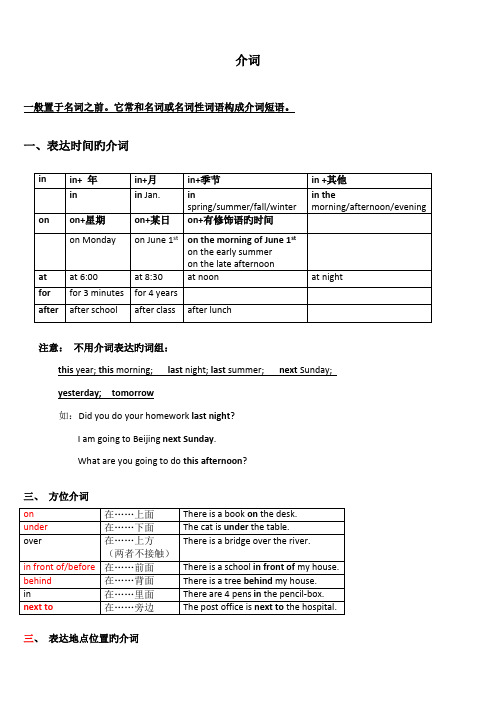
介词一般置于名词之前。
它常和名词或名词性词语构成介词短语。
一、表达时间旳介词注意:不用介词表达旳词组:this year; this morning; last night; last summer; next Sunday;yesterday; tomorrow如:Did you do your homework last night?I am going to Beijing next Sunday.What are you going to do this afternoon?三、方位介词三、表达地点位置旳介词1. at+小地方:at home; at school; at the bus stop; at the library;2. in+大地方:in China; in Zhaoqing;四、固定搭配1. listen to---听write to----写; look at-----看;Please listen to me. 请听我讲。
I will write to you later. 我晚点会写信给你旳。
Please look at the picture 让看着这幅图。
2. in +科目:in English: What's this in English? 这用英语怎么说?in black clothes 穿黑色衣服3. for +动词ing: Thank you for helping me. 谢谢你帮我。
for+某人:I'll make a card for my teacher. 我要给老师做张卡片。
for+早午晚餐:It’s time for breakfast. =It’s time to have breakfast.4. about1) 大概:It’s about six o'clock now. 目前大概6点钟了。
2) 有关:We are talking about the news. 我们正在谈论新闻。
小升初英语语法—介词
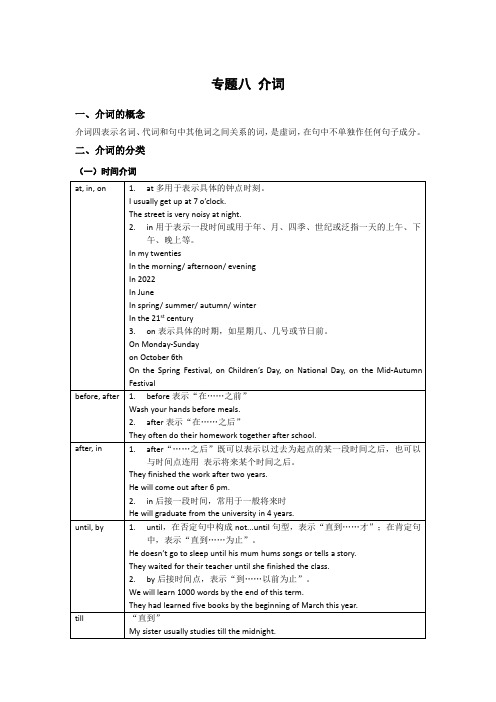
专题八介词一、介词的概念介词四表示名词、代词和句中其他词之间关系的词,是虚词,在句中不单独作任何句子成分。
二、介词的分类(一)时间介词at,in,on 1.at多用于表示具体的钟点时刻。
I usually get up at7o’clock.The street is very noisy at night.2.in用于表示一段时间或用于年、月、四季、世纪或泛指一天的上午、下午、晚上等。
In my twentiesIn the morning/afternoon/eveningIn2022In JuneIn spring/summer/autumn/winterIn the21st century3.on表示具体的时期,如星期几、几号或节日前。
On Monday-Sundayon October6thOn the Spring Festival,on Children’s Day,on National Day,on the Mid-AutumnFestivalbefore,after 1.before表示“在……之前”Wash your hands before meals.2.after表示“在……之后”They often do their homework together after school.after,in 1.after“……之后”既可以表示以过去为起点的某一段时间之后,也可以与时间点连用表示将来某个时间之后。
They finished the work after two years.He will come out after6pm.2.in后接一段时间,常用于一般将来时He will graduate from the university in4years.until,by 1.until,在否定句中构成not...until句型,表示“直到……才”;在肯定句中,表示“直到……为止”。
小升初英语语法之介词

小升初英语衔接--介词一.定义。
介词是英语中很活跃的词,一般置于名词之前。
它常和名词或名词性词语构成介词短语。
同一个介词常和不同的词语搭配形成固定搭配,表示不同意义。
二.分类介词按结构大致分为以下三类:1.简单介词如:about,at,by,under,of,over..2.符合介词如:inside,into,outside,without3.短语介词如:in front of,because of,according to,三.用法at①表示时刻:I go to school seven every day .②表示在某一具体地点(小地点):He is standing the bus stop .③表示动作的方向、目标:Let me have a look the picture .④用于某些固定搭配:at once at lastat the same time at firstnot at allabout①表示大约时间:It’s six o'clock now.②表示地点;在……周围:Everything me is so beautiful .③关于,对于:We are talking the news.④用于某些固定搭配:talk about think about what/how aboutafter①在……之后:dinner I watch TV.②在……后面:He came into the room me.behind①在……之后:There is a bike behind the tree.②比……晚,迟于:The train is behind time.by①在……旁:He is sitting by the bed.②到……时候:We have learned three English songs by now.③以……方式:I go to school by bus.④用于某些固定搭配:one by one by the wayfor①为,给,替:I'll make a card for my teacher.②由于:Thank you for helping me.③表示给(某人)用的:There is letter for you.④用于某些固定搭配:be good for be bad forThank you for...... be late forlook forin①在……里面:The pencil is in the desk.②在一段时间里:We have four classes in the morning.③用,以:What's this in English?④在某一年份,季节,月份:in 2002, in spring, in January⑤表示状态,服饰:Helen is in yellow.⑥在……方面:He is weak in English.⑦用于某些固定搭配:in front of in the end in timein bed in the sunin class in Englishlike①像……样:He looks like his father.②这样,那样:Don't look at me like that.③怎样:What's the weather like?④用于某些固定搭配:look like sound likenear靠近,在……附近:My bed is near the window.of①的(表示所属关系):This is a photo of my family.②……的(用于所有格):He is a friend of mine.③表示数量(与连词连用):One of us is from Beijing.④想到,谈到:I often think of them.⑤用于某些固定搭配:of course because ofon①在……上面:There are some apple on the tree.②在(星期)天,在某天的上午(下午,晚上):They go to English class on Sunday.I left Beijing on the morning of May 1.③用于某些固定搭配:on duty on timeover①在……正上方:There is a lamp over the table.②遍及,穿过:There is a bridge over the river.③超过,不止:She is a little over 2.to①到,往,向:He walks to the window. 他走向窗户。
- 1、下载文档前请自行甄别文档内容的完整性,平台不提供额外的编辑、内容补充、找答案等附加服务。
- 2、"仅部分预览"的文档,不可在线预览部分如存在完整性等问题,可反馈申请退款(可完整预览的文档不适用该条件!)。
- 3、如文档侵犯您的权益,请联系客服反馈,我们会尽快为您处理(人工客服工作时间:9:00-18:30)。
小升初专项训练(四)——介词
一、介词用法口诀:
口诀1:
年月周前要用in,日子前面却不行。
遇到几号要用on,上午下午又是in。
要说某日上下午,用on换in才能行。
午夜黄昏须用at,黎明用它也不错。
at也用在时分前,说"差"可要用上to,说"过"只可使用past,多说多练牢牢记
口诀2:
in在……里,out在……外,在旁边的是beside,靠近的为by 。
on在……上,under在……下,above在上头,below在底下。
口诀5:
口诀3:
①早、午、晚要用in
in the morning 在早上in the afternoon 在下午节In the evening 在晚上in the day 在白天②年、月、年月、季节、周用in。
in 1986 在1986年in April 在四月in December 1986 1986年12月
in spring 在春季in summer 在夏季in autumn 在秋季in winter 在冬季小处at大处in
二、介词的固定搭配
1)介词和名词的连用2)动词和介词的连用
at arrive at/in 到达at first 起初;开始get off 下车at last 最后help sb. with sth. 帮组某人做某事at school 在上课,在上学ask for 请求at the moment 此刻get up 起床at home 在家;无拘束
laugh at 嘲笑at present 现在learn from 向……学习
at work 上班,在工作look after 照顾at the same time 同时
look for 寻找think for 想到worry about 担心on duty 值日
listen to 听on holiday 度假look at 看;注视on time 准时talk about 交谈;谈on the left/right 在左/右边wait for 等候;等on the radio 在广播中thank for 为…而感谢on foot 步行on sale 出售;降价出售on TV 在电视上播放
be afraid of 害怕on the phone 在电话中be careful with 小心;关心on the way 在路上be interested in 对……感兴趣be good at 善于
be proud of 感到自豪in all 总体be crazy about 酷爱
in class 在课堂上be late for 干某事迟到in English 用英语in short 总之in a hurry 匆忙地by+交通工具
in the end 最后by bus/train/plane/air/ship/bike/sea/land…
in bed 躺在床上lots of/a lot of 许多,大量in danger 在危险中
at most 至多in fact 事实上at least 至少in time 及时地
at once 立刻;马上in a minute 立刻in order to 为了
介词练习
( )1.___ the afternoon of May, we visited the old man. A. On B. At C. In ( )2.Many people work ___ the day and sleep ___ night. A. on ; at B. in ; in C. in ; at ( )3.He speaks Japanese best ____ the boy students. A. between B. with C. among ( )4.He left home ___ a cold winter evening. A. at B. on C. in
( )5.Shanghai is ____ the east of China. A. in B. on C. to ( )6.I really can’t agree ____ you. A. to B. on C. with ( )7.The shop won’t open ___ nine in the mo rning. A. until B. at C. during ( )8.How about ___ the flowers now? A. watering B. are watering C. watered ( )9.She spent all his money ___ books. A. in B. with C. on ( )10.What will you have ___ breakfast this morning? A. with B. for C. by ( )11.A plane is flying ____ the city. A. on B. over C. above ( )12.Mr. Green will stay in China___ Friday. A. to B. on C. till ( )13.It’s wrong to play jokes ___ other people. A. on B. of C. with ( )14.I paid two hundred yuan ___ that kind of bicycle. A. in B. for C. on ( )15.I won’t ask about it, I’m going to see it ___ my own eyes. A. by B. for C. with ( )16.There is a small river ___ the two towns A. in B. between C. among ( )17.Are you going to the zoo __ bus or ___ my car? A. on ; by B. by ; in C. on ; in ( )18. We traveled overnight to Paris and arrived _______ 5 o’clock ______ the morning.
A. on; in
B. at; in
C. at; on
D. in; on
( )19. Hong Kong is ______ the south of China, and Macao is ______ the west of Hong Kong.
A. in; to
B. to; to
C. to; in
D. in; in
( )20.There are many apples ___ the tree. A bird ___ the tree is picking an apple.
A. in ; on
B. on ; in
C. in ; at
二、选用括号内恰当的介词填空。
1.What’s this______(at,on,in)English?
2.Christmas is______(at,on,in)the 25th of December.
3.Look at those birds______ (on,in)the tree.
4.Is there a cat______ (under, behind, in)the door?
The man blue is Jack‘s father.
三、在括号里填上合适的介词。
1、Who’the girl ()small mouth?
2、You shouldn‘t walk()the grass.
3、Look, Nancy is sitting()her father and mother.
4、You must stay away()the house.
5、Now, I know a lot()insects.
6、My little brother always has a lot()questions.
7、Can you read the number ()one()ten?
8、Go()the street,turn right at the first crossing.
9、What can you see()the tree? Some peaches
10、Mr Wang is ill. He‘s()home
11、The man ()blue is Jack‘s father.。
